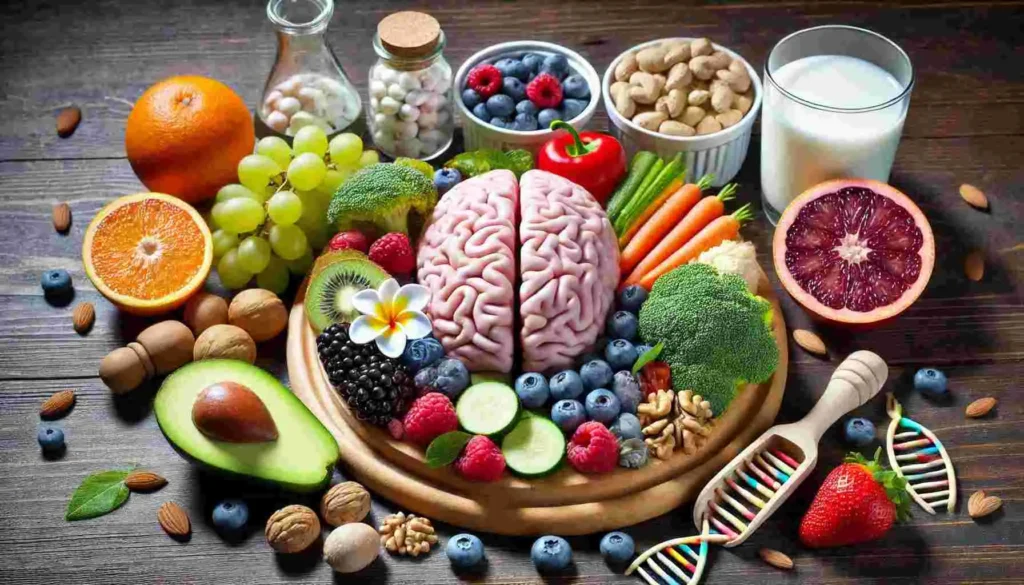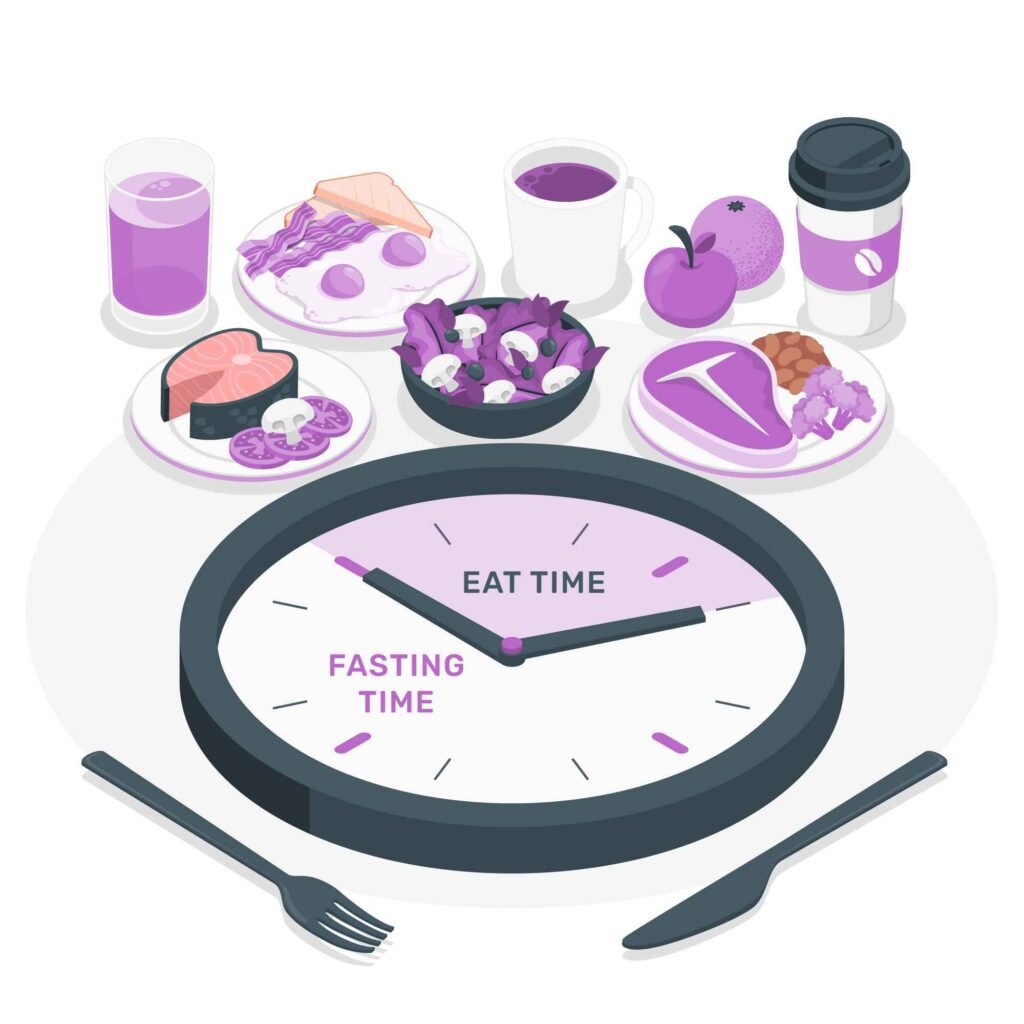
Cognitive Health and Nutrition: Foods to Boost Brain Function and Memory
The Connection Between Nutrition and Cognitive Health
How Nutrition Impacts Brain Function
The brain, a highly energy-demanding organ, requires a constant supply of nutrients to perform its complex tasks. Everything you eat influences brain chemistry, impacting focus, memory, mood, and overall mental performance. Poor dietary habits can lead to cognitive decline, while nutrient-rich foods promote neurogenesis (the creation of new brain cells) and neural plasticity (the brain’s ability to adapt and form new connections).
Key Nutrients for Brain Health
Several nutrients play a pivotal role in maintaining cognitive health. Let’s delve into the ones you should prioritize:
- Omega-3 Fatty Acids
Omega-3s, particularly DHA (docosahexaenoic acid), are essential for building and maintaining brain cells. Found in high concentrations in the brain, these fatty acids enhance communication between neurons and reduce inflammation. - Antioxidants
Free radicals can damage brain cells, leading to cognitive decline. Antioxidants like vitamins C and E neutralize these harmful molecules, protecting the brain from oxidative stress. - B Vitamins
Vitamins B6, B12, and folate are crucial for the production of neurotransmitters and DNA repair. They also help reduce homocysteine levels, a compound associated with cognitive decline. - Choline
Choline supports the production of acetylcholine, a neurotransmitter associated with memory and learning. It’s particularly vital during early brain development but remains important throughout life. - Complex Carbohydrates
The brain relies on glucose for energy. Complex carbs provide a steady supply of glucose, preventing mental fatigue and maintaining focus.
Foods That Boost Brain Function
1. Fatty Fish: The Ultimate Brain Food
Fatty fish like salmon, mackerel, and sardines are among the best sources of omega-3 fatty acids. Regular consumption is linked to improved memory and a reduced risk of Alzheimer’s disease. Aim for two servings of fatty fish per week.
2. Leafy Greens: Nature’s Cognitive Boosters
Spinach, kale, and other leafy greens are packed with antioxidants, vitamin K, and folate. These nutrients enhance brain health and slow cognitive decline.
3. Berries: Antioxidant Powerhouses
Blueberries, strawberries, and blackberries are rich in flavonoids, compounds known to improve memory and delay brain aging. A handful of berries daily can make a difference.
4. Nuts and Seeds: Brain-Friendly Snacks
Walnuts, almonds, and pumpkin seeds provide a mix of omega-3s, vitamin E, and magnesium. These nutrients protect against cognitive decline and improve mood.
5. Whole Grains: Sustained Energy for the Brain
Brown rice, quinoa, and oats supply complex carbohydrates and B vitamins. They ensure a steady release of glucose, keeping your brain energized throughout the day.
Lifestyle Tips to Maximize Cognitive Benefits of Nutrition
Stay Hydrated
Dehydration can impair attention, short-term memory, and decision-making. Drink plenty of water throughout the day to keep your brain functioning optimally.
Avoid Processed Foods
Refined sugars and trans fats can cause inflammation, which negatively affects brain health. Focus on whole, minimally processed foods for better mental clarity.
Pair Foods Wisely
Combining nutrient-rich foods, such as berries with yogurt or nuts with leafy greens, can amplify their brain-boosting effects.
Brain-Boosting Foods to Include in Your Diet
6. Eggs: Nature’s Multivitamin for the Brain
Eggs are an excellent source of choline, which is essential for memory and cognitive function. The yolk also contains lutein, an antioxidant linked to brain health. Including eggs in your breakfast can enhance focus and set a productive tone for the day.
7. Avocados: Creamy and Brain-Friendly
Rich in monounsaturated fats, avocados promote healthy blood flow, which is critical for brain function. They also contain vitamin E, which helps protect brain cells from oxidative stress. Add avocado to salads or toast for a nutrient-packed meal.
8. Dark Chocolate: A Sweet Cognitive Treat
Dark chocolate, especially varieties with at least 70% cocoa, is rich in flavonoids, caffeine, and antioxidants. These compounds improve blood flow to the brain, enhancing memory and focus. Moderation is key—just a small piece daily is enough to reap its benefits.
9. Turmeric: The Golden Spice for Cognitive Health
Curcumin, the active compound in turmeric, has powerful anti-inflammatory and antioxidant effects. It has been shown to improve memory, boost mood, and support the growth of new brain cells. Incorporate turmeric into soups, teas, or curries for a flavorful cognitive boost.
10. Legumes: Affordable Brain Fuel
Beans, lentils, and chickpeas are packed with folate, iron, and magnesium—all crucial for brain health. They help regulate blood sugar levels, providing the brain with consistent energy throughout the day. Include legumes in soups, salads, or main dishes.
Lifestyle Factors That Complement Cognitive Nutrition
Regular Physical Activity for Brain Health
Exercise increases blood flow to the brain and stimulates the production of brain-derived neurotrophic factor (BDNF), a protein that supports learning and memory. Activities like walking, swimming, and yoga enhance cognitive health when paired with a nutrient-rich diet.
Quality Sleep: The Brain’s Maintenance Period
Sleep is essential for memory consolidation and toxin removal from the brain. Nutrients like magnesium and tryptophan, found in foods like nuts and dairy, can help improve sleep quality. Establishing a consistent sleep schedule further supports cognitive function.
Mindful Eating for Brain Optimization
Eating with intention can improve digestion and nutrient absorption. Take the time to chew thoroughly, savor flavors, and avoid distractions during meals. This practice ensures your brain gets the full benefit of the nutrients you consume.
Building a Cognitive-Boosting Meal Plan
Breakfast: Fuel Your Morning
- Option 1: Scrambled eggs with spinach and whole-grain toast
- Option 2: A smoothie with berries, avocado, and almond milk
Lunch: Midday Mental Recharge
- Option 1: Grilled salmon salad with leafy greens, walnuts, and a lemon-olive oil dressing
- Option 2: Lentil and vegetable soup with a side of whole-grain bread
Snack: Keep Your Brain Energized
- A handful of dark chocolate pieces and raw almonds
- Greek yogurt topped with blueberries and pumpkin seeds
Dinner: End the Day with Brain-Boosting Nutrition
- Option 1: Turmeric-infused chicken curry with quinoa and steamed broccoli
- Option 2: Baked avocado halves stuffed with chickpeas, topped with melted cheese
Hydration: The Unsung Hero
Keep your brain hydrated by drinking water throughout the day. Herbal teas and fresh fruit-infused water are excellent alternatives to sugary beverages.
Foods to Avoid for Better Cognitive Health
While some foods enhance brain function, others can impair it. Be mindful of these dietary pitfalls:
1. Refined Sugars
Sugary snacks and drinks can cause spikes and crashes in blood sugar levels, leading to brain fog and reduced focus. Opt for natural sweeteners like honey or maple syrup in moderation.
2. Trans Fats
Found in processed snacks and fast foods, trans fats can contribute to inflammation and negatively affect memory. Check labels and avoid items containing partially hydrogenated oils.
3. Excess Alcohol
While moderate red wine consumption can have cognitive benefits, excessive alcohol intake impairs brain function and damages brain cells. Limit alcohol consumption to recommended guidelines.
4. High-Sodium Foods
Salt-heavy diets can lead to high blood pressure, reducing blood flow to the brain. Reduce intake of processed and packaged foods, opting for fresh, homemade meals instead.
Nutrition Tips for Different Life Stages
Children and Adolescents
Growing brains require omega-3 fatty acids, iron, and antioxidants for proper development. Focus on foods like fatty fish, eggs, and colorful fruits and vegetables to support learning and memory.
Adults
To combat stress and maintain productivity, adults should include a balance of lean proteins, healthy fats, and complex carbohydrates. Incorporating dark chocolate and nuts can also provide a cognitive boost during busy workdays.
Seniors
Aging brains benefit greatly from antioxidant-rich foods and anti-inflammatory spices like turmeric. Leafy greens, berries, and whole grains help preserve memory and reduce the risk of age-related cognitive decline.
Advanced Strategies to Optimize Brain Health with Nutrition
Meal Timing and Brain Function
When you eat is as important as what you eat. Irregular eating patterns can lead to fluctuations in blood sugar levels, negatively impacting mental clarity and focus. Here’s how you can structure your meals for cognitive health:
- Start the Day Right
A nutrient-dense breakfast helps replenish glucose stores and energizes your brain for the day ahead. Skipping breakfast can cause brain fog and difficulty concentrating. - Midday Fuel
Lunch should include a mix of protein, healthy fats, and complex carbs to sustain energy and mental sharpness. Avoid heavy, greasy meals that can lead to sluggishness. - Evening Nutrition
Dinner should focus on lighter, brain-boosting foods to avoid digestive strain and promote restful sleep. Incorporate magnesium-rich foods like leafy greens and nuts to help the brain relax.
The Role of Intermittent Fasting in Cognitive Health
Intermittent fasting (IF) is gaining popularity for its potential cognitive benefits. Fasting periods stimulate the production of brain-derived neurotrophic factor (BDNF), which supports memory and learning. It also helps in autophagy, the brain’s natural detox process.
If you’re new to intermittent fasting, start with a simple 12:12 schedule (12 hours fasting and 12 hours eating) and gradually adjust as your body adapts.
Supplements to Consider for Brain Health
While whole foods should be the primary source of nutrients, certain supplements can complement your diet to enhance brain function. Always consult with a healthcare provider before adding supplements to your routine.
1. Omega-3 Fish Oil
For individuals who don’t consume fatty fish regularly, omega-3 fish oil supplements are a great alternative. They support neuron health and reduce inflammation.
2. Vitamin D
Vitamin D deficiency has been linked to cognitive decline and mood disorders. If sunlight exposure is limited, consider a supplement to maintain healthy levels.
3. Magnesium
Magnesium helps regulate neurotransmitters and promotes relaxation. It’s especially helpful for individuals dealing with stress or sleep disturbances.
4. Probiotics
Gut health is closely linked to brain health through the gut-brain axis. Probiotic supplements can enhance gut microbiome diversity, supporting mood and mental clarity.
Creating a Brain-Friendly Lifestyle
Manage Stress for Cognitive Wellness
Chronic stress floods the brain with cortisol, impairing memory and decision-making. Pair brain-boosting nutrition with stress management techniques like meditation, yoga, or breathing exercises to support overall mental health.
The Importance of Social Connections
Social interaction stimulates brain activity and improves cognitive resilience. Share meals with family and friends to create a positive association with healthy eating and reinforce mental well-being.
Incorporate Lifelong Learning
Mental stimulation through puzzles, reading, or learning new skills helps maintain cognitive sharpness. Pair these activities with brain-friendly snacks like nuts or berries for an added boost.
Signs of Cognitive Improvement
Implementing a brain-friendly diet and lifestyle will show noticeable benefits over time. Look out for these signs of cognitive improvement:
- Enhanced Focus and Productivity
You’ll find it easier to concentrate on tasks and process information efficiently. - Improved Memory Recall
Brain-friendly foods and nutrients help strengthen memory, making it easier to remember details. - Better Mood Stability
Antioxidants and omega-3s reduce inflammation and support emotional regulation, resulting in fewer mood swings. - Reduced Mental Fatigue
A well-nourished brain is less prone to mental exhaustion, even during demanding days.
Practical Tips for Sustained Cognitive Health
Rotate Brain-Boosting Foods
Instead of sticking to the same meals, rotate brain-boosting foods like fatty fish, leafy greens, and nuts to keep your diet interesting and nutrient-rich.
Experiment with Recipes
Try creative recipes like blueberry smoothies, turmeric-infused golden milk, or quinoa and spinach salads. This approach makes brain-friendly eating enjoyable and sustainable.
Meal Prep for Convenience
Preparing nutrient-rich meals in advance ensures you always have healthy options available, even on busy days.
Limit Cognitive “Zappers”
Avoid habits that drain cognitive energy, such as excessive caffeine intake, screen time before bed, and consuming high-sugar snacks.
The Future of Cognitive Nutrition
Personalized Nutrition for Brain Health
Advancements in technology are paving the way for personalized nutrition plans based on genetic testing and biomarker analysis. These tailored approaches optimize brain health by addressing individual nutrient deficiencies.
The Role of Functional Foods
Functional foods like fortified cereals, probiotic yogurts, and beverages with added antioxidants are becoming popular for their potential cognitive benefits. Incorporating these foods into your diet can further enhance brain function.
Emerging Research on Brain and Diet
Ongoing studies are exploring the impact of specific diets, like the Mediterranean and MIND diets, on long-term cognitive health. These diets emphasize whole foods, healthy fats, and minimal processed ingredients, providing a roadmap for future dietary guidelines.



